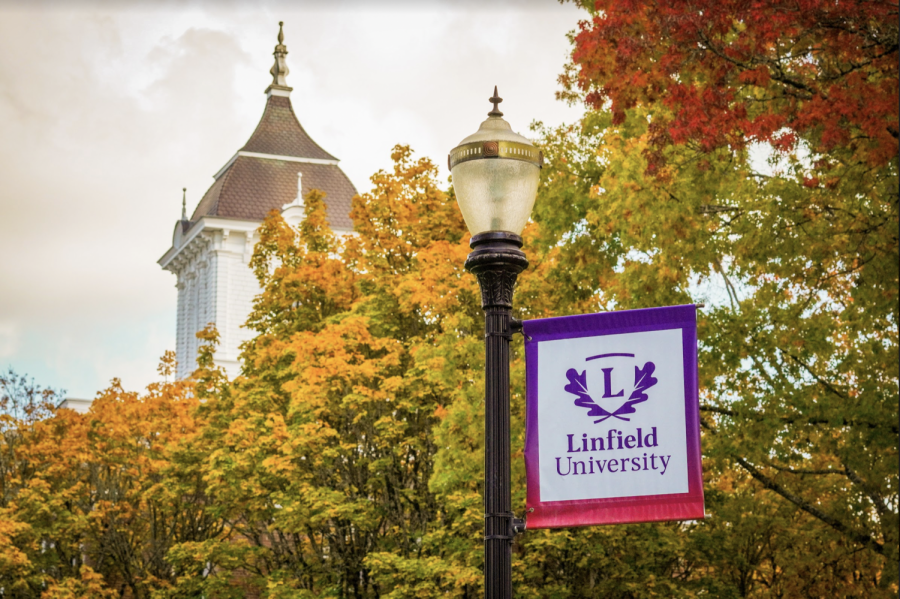Students react to sexual misconduct awareness training, alternative option to be offered
October 21, 2021
Linfield University’s decision to require all students to complete sexual misconduct awareness training by Oct. 1 has caused a stir on campus. Many students have said they oppose the course itself due to its content. In response, the Associated Students of Linfield University (ASLU) proposed alternative ways to complete the requirement.
Students now have the choice to participate in an in-person training instead. The deadline has been pushed back to Jan. 1 to accommodate this new development.
In the online training, the student is virtually placed in the role of both victim and perpetrator–similar to a role-play video game. For each situation, the student is asked to pick the most appropriate actions and responses to move the simulation forward.
The student is asked to make tough decisions and must learn from their mistakes before moving forward. In many cases, interactive learning is an important tool for educators.
However, this role-play style training can be triggering to students who are survivors of sexual misconduct.
This is where the concerns heard by ASLU stemmed from. Many students believe this training was not a good idea, was not the right approach, or simply missed the mark.
One of these students is Beatrice DeGraw, a senior literature major. DeGraw sent an email to the administration expressing frustration at the school, how they have handled sexual misconduct reports, and the requirements surrounding this training.
Screenshots of the email were shared via Instagram amongst students.
“When I first found out that they were mandating this sexual misconduct and harassment training I said ‘Okay I understand why we are doing this’ and ‘I am for that,’” DeGraw said, in an interview with The Linfield Review. “But I didn’t think it was particularly well-intended.”
DeGraw said that the more they learned about the training, the more it didn’t sit right with them.
“This is really not okay to force this problem of fixing institutional problems onto students, but also the training itself is really, really alarming and really upsetting,” DeGraw said.
This was not the first email that DeGraw has sent to the administration expressing their frustrations. They said that they have not received any response from the school regarding this email or any in the past.
“Requiring students who have experienced sexual assault, sexual harassment, or any sort of sexual misconduct to go through these things is often quite retramauatizing,” said DeGraw.
DeGraw’s and other student’s concerns were brought to ASLU. ASLU quickly worked to create new options for completing this training.
“[Dean of Students Jeff MacKay] told ASLU that the whole goal is to keep the campus safe, so if [the online training] is not doing it, then we’ll have to find something else. So we in ASLU found something else and we hope to bring it to campus soon,” said ASLU cabinet member Allison Hmura.
This in-person option is still in the works. Hmura said it would serve as a “survivor-safe training,” meaning even if a person is a survivor of sexual misconduct, they should feel comfortable participating.
Participation in this training excuses students from the online training. Though it is not clear yet how it will be conducted, Hmura said it will be in a group setting.
“I think it is a lot easier to go with your friends. You feel more comfortable and you’re in an atmosphere where other people get it, instead of behind your computer dealing with it all by yourself,” said Hmura.
There has always been an option not to participate in training, according to Hmura, but through student concerns, Hmura said ASLU learned two big issues with the procedure.
First, the person students were required to reach out to was a male. For some victims of sexual assault, speaking with a male about their trauma can be uncomfortable. Secondly, in some cases, students could not explain why they were unwilling to participate in the training without taking the next step of filing an official report.
Now, there is a resource for students to reach out to with concerns about the training. Kelsey Murray is the new confidential Coordinator of Student Wellness and Survivor Advocacy. She does not require students to file an official report and checks with students to make sure they are okay.
Students can reach out to Murray by email at [email protected] or stopping at her office in the Student Health, Wellness, and Counseling Center in Walker Hall on the McMinnville campus.
“I am really glad that there was some sort of response to my email that seems to be perhaps a better option, or a more well thought-out and sensitive option for students,” DeGraw said.
More information regarding the in-person training is expected to be announced soon by ASLU.
“At this point the world is so unsafe, we should at least be able to make it better on our campus,” Hmura said. “People shouldn’t be afraid to walk from Starbucks to the library.”


RAYMOND SIFDOL • Oct 24, 2021 at 9:47 am
And if anyone attacks you between Starbucks and the library, throw a hot cup of Mocha in their face, and run to the library. Got it!?
RAYMOND SIFDOL • Oct 23, 2021 at 8:37 am
Women should learn martial arts. It works!